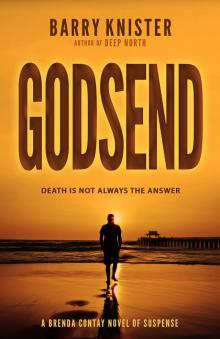- Home
- Barry Knister
Deep North (A Brenda Contay Novel Of Suspense Book 2)
Deep North (A Brenda Contay Novel Of Suspense Book 2) Read online
HOW FAR WOULD YOU GO TO PROTECT YOUR CHANCE FOR HAPPINESS?
Journalist Brenda Contay seems to have it all: a Pulitzer Prize, plenty of money and lots of friends. Just one thing is missing: a relationship that counts.
That seems about to change when lawyer friend Marion Ross invites Brenda to go fishing in northern Minnesota. But they won’t be roughing it: they’ll be staying on a big, comfy houseboat. Charlie Schmidt has a cabin nearby, and before long, Brenda is thinking a lot about Charlie’s gracefulness and good looks.
But two other men have followed the women. Louis Rohmer knew Marion in college, and has an Internet scheme to steal everything she’s worth. Jerry Lomak is much more dangerous: Marion’s legal skills destroyed him in court. He’s headed for prison, but Lomak has no intention of doing time, or of letting a woman lawyer get away with her “crimes.”
It’s a beautiful place, northern Minnesota. Cold, clear, unblemished. But none of it will count when Brenda Contay must choose between losing her chance for happiness, or committing a terrible crime.
A Brenda Contay Novel of Suspense: Book 2
DEEP NORTH
Copyright © 2015 Barry Knister
All rights reserved. Except as permitted under the U.S. Copyright Act of 1976, no part of this publication may be reproduced, distributed, or transmitted in any form or by any means, or stored in a database or retrieval system, without prior written permission of the publisher.
This book is a work of fiction. The characters, incidents, and dialogue are drawn from the author’s imagination and are not to be construed as real. Any resemblance to actual events or persons, living or dead, is entirely coincidental.
Print edition ISBN numbers:
ISBN-13: 978-1515124252
ISBN-10: 1515124258
The poem, Peonies, by Mary Oliver
used by permission of the author.
ALSO BY BARRY KNISTER
BRENDA CONTAY NOVELS
The Anything Goes Girl
OTHER NOVELS
Just Bill
Deep North is dedicated to
Bob Nelson and Jim Sheahan
FRIDAY, MAY 4
BIRMINGHAM, MICHIGAN
5:00 P.M.
The housekeeper glanced in the rearview at the teenager in the back seat. “You got everything now? Pillow? CDs? You take a sweater?”
“God, for the zillionth time—”
“I’m just checkin’ like your mamma told me to.” She looked back to the road. “So you got no reason to go back in that house.”
“Tanya—”
“Yeah, you ‘Tanya’ all you want. Your mamma seen that Risky Business picture. She know what goes on when parents leave home.”
The girl looked away, and Tanya again faced the road. Carrie Ross was a good girl, though. A nice girl. Nevertheless, the housekeeper kept her face hard for the rearview. She slowed on Maple and turned onto Mallard Lane. Ahead, Brittany Remnick stepped out of her parents’ big Dutch colonial. Hugging herself in the gray and chilly afternoon, she started down the brick walkway.
“Maybe I should go in and talk to this girl’s mamma.”
“Oh, please don’t.” Carrie undid her seatbelt and leaned forward. “Please don’t embarrass me. Mom talked to her; she told you everything’s cool.”
“Yeah, you cool all right.”
But that was probably true, the two mothers arranging for Carrie to stay with her friend while Mrs. Ross went fishing in Minnesota. Tanya slowed at the curb and stopped. Carrie was out instantly, the two girls jumping and jabbering the way they always did. Tanya popped the trunk and looked again in the rearview. Almost instantly it was slammed shut. Wants you gone, she thought and smiled. Wants you history.
She watched Brittany start back up the walk, carrying the duffle bag. Carrie fell in behind with her box of CDs and the pillow she always took on sleepovers. The housekeeper put the car in gear and pulled away. Deposit her check, and she was home free for a week. Then she remembered: the check was still on the countertop in the Ross kitchen. Damn. Carrie had forgotten her pillow and run back upstairs. Waiting for her had thrown Tanya off a second.
Resigned, she swung into the next driveway, backed down and around. She passed the Remnick house and thought again about where Mrs. Ross and her friends were going. Some big old houseboat floating around in Minnesota in some string of lakes called the Boundary Waters. Bunch of ladies don’t know nothing about it, Tanya had said. That’s the point, Mrs. Ross told her. To see if we can manage.
Minutes later, she pulled in at the Ross house, got out, and crossed the back drive. A flagstone path led to the patio. At the French doors she pressed the security button. The light blinked off, she inserted her house key, and turned the handle. Still locked. She turned the key again, and this time the handle levered down.
Tanya studied the key. The door had already been unlocked. It made no sense; she had checked all the doors before leaving with Carrie.
That little monkey. Carrie had come after and unlocked it for some risky business later. But that made no sense, either. She had her own key, plus a spare was kept under the firewood box on the patio.
Tanya let herself in, and eased the door shut. She stood in the big dining room. Familiar silver and china glinted in the two breakfronts. The porcelain pheasant centerpiece stood where it belonged on the table. Through the arch lay the sprawling living room; groups of furniture rested on Oriental carpets in the milky light coming through sheer curtains. She listened a moment before stepping through the open door into the kitchen. Silence. The room was spotless as she had left it, her check still on the counter.
She crossed the glossy slate floor. A dish towel draped over the sink reminded her of towels loaded earlier in the clothes dryer. As with her check, the delay for the pillow had made her lose track of time, and the towels might mildew. Still troubled by the unlocked door, Tanya crossed to the basement stairs.
Something was wrong. “Who’s there?”
She started down, reached the landing and looked below. A light was on. “Let me hear whoever you is, ‘cause I know you down there.” Nothing. You crazy, she thought. It was just the big house being empty, and a rusty door lock.
She continued down the stairs, turning right into the laundry room. It was clean but gloomy, with naked floorboards overhead, ductwork, and wires. At the dryer she knelt and began pulling the still-warm towels out onto the open door. When she had them all, Tanya gathered them in her arms, kneed shut the dryer, and turned.
Now, though, she saw another light.
Holding the warm towels, she retraced her steps, moved around stored patio furniture, and stepped into the dim furnace room. Beneath the naked bulb, on the gray-painted floor, rested what looked like two clocks. Not clocks, though. Timers. Like what Mr. Ross used on lamps when the house was empty. Why down here? You put timers on lights or a radio to make people think you was home. Wires trailed from the boxes, back behind the furnace.
She turned away, walked back to the stairs, and started up. She would phone the police to be on the safe side.
“Hello.”
“Jesus God!” Clutching the towels, she looked up. He was standing on the landing, looking down.
“Hey, sorry.”
“What the hell you doin’?”
He was white, wearing a uniform of some kind, blue. He pointed to a badge on his chest. “MichCon.”
“The gas company? Bullshit.” She felt her heart pounding, but glared up at him.
“No, lady, really. You got a leak that showed up on our computer.” He fished in his pants pocket and brought out a piece of paper. “I g
ot a work order here says to get the patio key and let myself in.” He unfolded the sheet and looked at it. “Name’s Ross? We called her office and got her cell phone. She explained about the alarm and the key under the firewood.”
Tanya wasn’t buying it. “Where’s your truck? I didn’t see no truck.”
“My partner has another call, same problem. It’s probably just faulty sensors. He dropped me off, he’s coming back in a half hour. You must be the cleaning lady. This Mrs. Ross—”
“She didn’t say nothing about it.”
“Well, she couldn’t, could she? We just got the readout and called. On her way to Milwaukee, she said. ‘No one’s home, do what you have to and let yourself out,’ is what she said.”
Tanya stared at him. He did seem to have his facts straight.
He smoothed the sheet of paper and held it out. “It’s no break-in, lady. Here’s the work order.”
She started up the stairs again. It was his white-blond hair, she now realized, that made him look strange—not the color, but the way it lay on his head. Understanding this made Tanya feel less fearful.
She stopped two steps below him, took the paper, and studied it. It looked like a work order, the name and address right. “Backhoe break” was scrawled across the page. Except…
He couldn’t call Mrs. Ross. She’d turned off her cell phone. That was part of a promise to Carrie—except for emergencies, no calls. And those timers in the furnace room…
Let him think she believed. “Okay, that looks ‘fficial to me. I come back from running some errands is all. You go on finish up on the leak, but give me the key so we don’t got to change the locks. The missus got a lot of nice things someone like to get their hands on.”
“Sure.”
He reached in his pocket and handed her a key. It was shiny and new, not weathered like the one kept on the patio. And now she saw he wore latex gloves. Paper boots covered his shoes.
“I’ll leave the way I came in. You can lock up after you’re done with the laundry.”
“Good, you leave.”
She hoped her fear didn’t show in her voice. The fake work order meant he had known exactly when the house would be empty. She needed to get out and drive. Straight to the police. He was still blocking her way. “You don’t believe me.”
“’Course I do, you got a work order—” She took a step up and moved to push past with the laundry.
He held out his arm. “It’s Tanya, right?”
He knew she knew. Heard it in her voice.
“You let me pass,” she said, not looking up. “Lot of people know I’m here, start wondering pretty quick—” She butted at him with her shoulder. “Don’t want no trouble. You got a wrong house or something, all right, that happens, you just let me pass—”
“Lady, don’t fuck around—”
She butted again. Suddenly he shoved her shoulders with both hands.
As her feet left the steps, she felt sick and weightless. Falling away, she glimpsed his white-blond hair, the low ceiling’s gray paint, and remembered her check before she hit the stairway’s bottom step.
Her shoulder struck first, whipping her neck. The back of her head struck the concrete floor. She saw and felt stars. Groaning, she felt her heavy body like a thing thrown after her. It shoved her down, until it lay like a thing apart, on top of her.
Pain and white light. Skull and shoulder both fractured, Tanya closed her eyes and groaned. It was bad, but she was alive. She would make it.
She looked up at the bright bulb overhead. Again Tanya closed her eyes and lay still. Moving made it worse.
Shoes were scuffing, going. He was gone, and she was going to make it. Eyes shut, she felt pain thudding with her heart in waves. In whatever time had passed, a profound sleepiness came to her. It was still there with the creak of floorboards above, then nothing.
WESTBOUND INTERSTATE 94
Gently rocked in the passenger seat, half smiling, Brenda Contay stared out the Chevy Suburban’s windshield. Slowly the anonymous fields faded. She saw herself standing under the shower in her bathroom—and the door banged open. The curtain was scraped away and there stood David Santerro, thick-muscled from college football. He reached in and lifted her out as you would lift a child from a bath, flattened her against him, and kissed her.
“Brenda?”
She felt herself being walked from the bathroom, feet off the ground—
“Brenda? You okay?”
The windshield materialized. “I always want to smoke in cars. I drift off thinking about it.”
Hands on the steering wheel, Marion Ross shook her head. “As Carrie would say, you are so lying.” She glanced over and back to the road. “I bet it was sex. You should see your cheeks.”
“All right, you got me.” Brenda lifted her coffee from the cup holder.
“David?”
“Yes, David.”
“Do you miss him?”
She pretended to think about it. “Yes and no. I was always glad to see him. I was just never really sorry to see him go. Which he did all the time.”
Was that true, or said for effect? This time, Brenda actually thought about it, in the focused way that sometimes happened at odd moments. A kaleidoscope skipped through her memory—bits and pieces of concerts, football and basketball games, restaurants, bedrooms. It now seemed that her memories of David registered only as data, as information without meaning. What she missed was missing him.
“Does he email you?” Marion asked.
“Oh sure, I’m his default girl. His numero uno cybersqueeze.”
She looked back to the road. It had been nice enough with David Santerro, in a haphazard, generous sort of way. They had both known it would not “become something.” But after being with someone for five months, there had to be something wrong with not really knowing him beyond his basic stats and style, his body type and commando approach to sex.
No. Not being bothered, that’s what was wrong. Five months of beepers and apologies as he walked away, hand cupped over his left ear, cell phone clamped to his right. In lines at movie theatres and restaurants, waiting for the ski lift at Boyne Mountain—and she hadn’t cared.
“You told me his mother named him for David Brinkley,” Marion said.
“Correct.”
“So now he’s a journalist. Destiny at work.”
She had lied about it just now, but for the last hour Brenda Contay had wanted a cigarette. Clean for a year, she decided it must have to do with the motion of driving. That also might explain thinking about sex. Certainly nothing in the Chevy Suburban provided any temptation to smoke. The ashtray would be as untouched as the day it was made.
She looked over her shoulder at the gear mounded behind the back seat. Fishing rods, tackle boxes, canvas duffles.
“Everything still there?”
“Still there.” She turned back and folded her arms. “Aren’t you tired? I could take the wheel.”
Marion shook her head. She was dressed for the outdoors in a red chamois shirt and jeans. In profile, with her chestnut hair swept behind her ear, she looked gentle. Maternal. Face to face, though, Marion Ross could be sharp-eyed and intimidating. Even a little scary. It was a quality she put to good use in court, but it made for problems at home. With Carrie.
“I’ll get us to Wisconsin,” she said. “You can take over there. If you aren’t having one of your sex spells.”
“You must love to drive.” Brenda pointed to the clock. “It’s been almost five hours.”
“In this thing I do. Sitting up high, cruising the interstate. My best closing arguments get worked out this way.”
Having passed the derelict steel factories of Gary, Indiana, they were now south of Chicago. Franchise hotels and corporate office buildings slipped by on both sides of the expressway.
“Hear it?” Marion smiled. “No radio or TV. Pager on the dresser, computer on the desk. I can’t tell you how much I need this.”
Yes, the big SUV was qui
et. And it was quiet back home. These days, Brenda made only occasional trips to WDIG. She had returned last year to television but on her own terms. Her book about a drug company scandal in Micronesia was the reason: Blue Sky Six had won a Pulitzer, and the book’s success had freed her from regular reporting. Now, she did think pieces once a month, in a sound studio.
“About the others,” she said. “You mentioned someone had to cancel.”
Marion finished passing a trailer truck and eased back into the right lane. “Right, Marcie Long. From my office. She was supposed to be our brain trust, she does a lot of camping. When she backed out, I called Heather Reese.”
“Your college classmate.” Marion nodded. “You said she’s a throwback.”
“I suppose that was snarky of me. But Heather does sort of take you back to the fifties. Home and hearth, committees. Her husband fishes, he’s letting us take his boat. After college I went to Europe, Heather and Brian got married. You’ll see what I mean tonight.”
“Did you tell her about me?”
“Of course.”
“And were you snarky?”
“I told her about Zapped!”
“Oh, great, Zapped! Thanks a lot.”
“Hey, you wrote it, I didn’t.”
Two years before, Brenda had done a profile on Marion for Elle. It was how they’d met and become friends. A well-known local lawyer had secretly sold off his assets in preparation for divorce. When a friend called his wife and told her what was going on, the husband was just then soaking in the hot tub on the deck. Hold on a minute, the wife said. She had stepped outside and tipped the bug whacker into the tub. All right, I’m back, she told the friend. A bug needed whacking. Thanks to Marion Ross, the new widow had spent just eleven months in a psychiatric clinic.
“And someone named Tina,” Brenda said. “She taught in Milwaukee?”
Marion nodded. “At a community college. She has MS and just retired. Heather asked if she could come along. I’ve never met her, but she sounds interesting.”

 The Anything Goes Girl (A Brenda Contay Novel Of Suspense Book 1)
The Anything Goes Girl (A Brenda Contay Novel Of Suspense Book 1) Deep North (A Brenda Contay Novel Of Suspense Book 2)
Deep North (A Brenda Contay Novel Of Suspense Book 2) Godsend
Godsend Just Bill
Just Bill